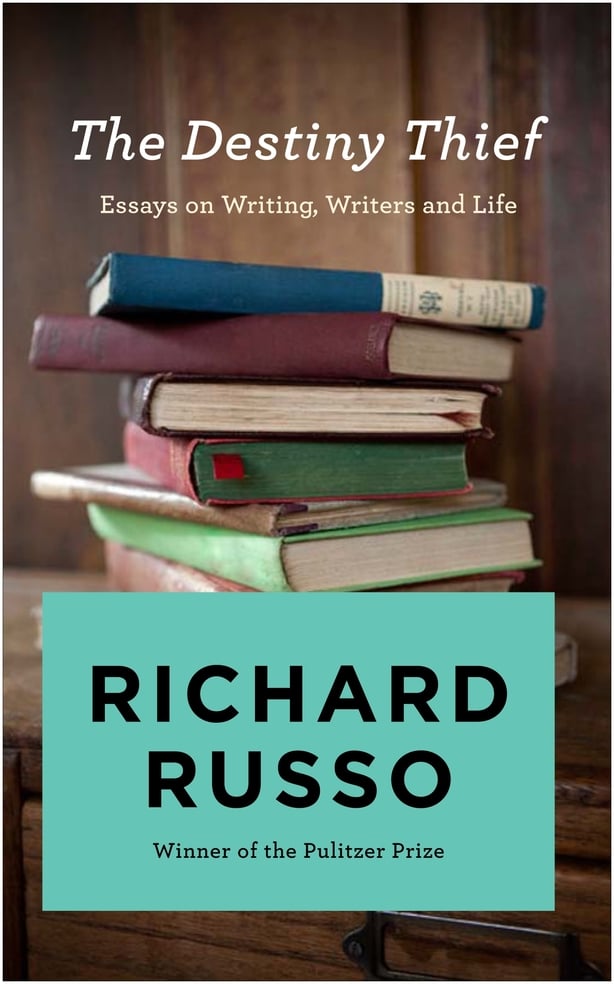In The Destiny Thief – Essays on Writing, Writers and Life, the Pulitzer Prize-winning author and Sprinsgsteen fan Richard Russo recalls his desire to be in a rock band before he became a successful author of fiction and screen-writer.
In the titular essay, The Destiny Thief, Russo recalls Gloversdale in upstate New York, the mill town in which he grew up and which he plainly describes as 'poor.' After his various academic hurdles had been crossed, when he first began lecturing at Penn State Universiy, it looked like the author was going to be a teacher for life. In time, he would want the writing life with a burning, primal desire and, fortunately for him, he become one of that rare breed, a full-time writer, and a very successful one at that.
Russo recalls attending a fiction workshop forty years ago at the University of Arizona where his teacher, Robert CS Downs, was blunt. Most writers, he remarked, had about a thousand pages of "shitty prose" in them, and these have to be expelled before they can hope to write seriously. "In your case,’’ he declared, addressing the keen student of creative writing, "make it two thousand."
Many a slip, in other words, between the lip and the coveted Pulitzer cup which the author won for his novel Empire Falls, which he adapted into an award-winning HBO miniseries. Aside from eight novels and two collections of stories, Russo also wrote an acclaimed memoir, On Helwig Street, and several screenplays.
In his essay The Gravestone and the Commode, which is included here, the author, who considers himself to be a comic writer, investigates the mechanics of the risqué joke. He meticulously tracks the manner in which such jokes impact on people, and how listeners laugh for all sorts of reasons and laugh too when they feel they shouldn’t be laughing. If the person hearing the joke says `that’s not funny’, such a response is inconclusive, even simplistic, as Russo sees it.
The joke in bad taste, in other words, is a hard one to pin down. He looks at his fellow Americans and their reaction to risqué or what we often describe as politically incorrect jokes. The essayist understands the desire to button down or censor. That our impulses are sinful, our natures fallen, is a puritan view, and this strain in American life has always run wide and deep, he writes.

Somehow the essay in its pleasantly wandering way gets on to the subject of Russo’s relationship with Russo senior. He realised at some point that The Risk Pool, the novel he had been working on at the time of his father’s passing, had been in effect a farewell note.
The story featured imagined conversations that the pair would never have in real life. Here, I got to play both parts, a duty I accepted cheerfully enough until I learned he was ill, which meant that after he died I’d have to play both parts forever, a job I wasn’t sure I was up to. There is something wistful and resonant about that sentence and Russo is confident enough with it to leave it hanging there mysteriously.
The essay Getting Good examines the business of work through three generations of Russo, namely grandfather, father and son, beginning with some reflections on guild and union membership. Russo traces how such institutions impinged on his own life as screenwriter and fiction writer, on that of his grandfather, a fastidiously proud glove-maker and on his father, a hard-working road builder. Dad paid the year-long union dues for his son although, as a student Richard of necessity worked for just the three summer months. His stint with a carpenters’ crew is recalled with some salty humour, and a few expletives actually enliven the piece. Stand around leaning on your shovel too long and somebody’s going to come over and tell you to go home.
There is a report on Russo’s visit to Bulgaria to assist native creative writing students - the Springsteen theme gets full rein towards the close in unusual circumstances. In Imagining Jenny, there is a particularly bleak account of Russo's decison to accompany a lecturer friend who was pursuing gender-reassignment (as Jim became Jenny.)
His address to the graduates of Colby College, delivered in 2004, is shrewd and humane and should be read by all who are starting out on a working life, be they graduate or not. The piece should be read by all parents also, so that they too might learn perspective about what their kids should aim for in life - it’s size fits all, and it’s not just for American aspirations. In The Destiny Thief, Richard Russo has assembled an amiable, thought-provoking collection, and when you have read the essays, move on to his brilliant story collection Trajectory. which was reviewed in these pages last year.







